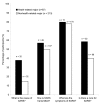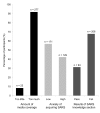Media effects on students during SARS outbreak
- PMID: 15890131
- PMCID: PMC3320361
- DOI: 10.3201/eid1105.040512
Media effects on students during SARS outbreak
Abstract
A few months after the 2003 severe acute respiratory syndrome (SARS) outbreak, a sample of Canadian undergraduate university students completed a questionnaire that showed that, despite believing media coverage of the outbreak was excessive, they had little anxiety about acquiring SARS. Additionally, 69% of participants failed a SARS-specific knowledge section of the questionnaire.
Figures


References
-
- Drache D, Feldman S, Clifton D. Media coverage of the 2003. Toronto SARS outbreak: a report on the role of the press in a public crisis [cited 2003 Nov]. Available from http://www.robarts.yorku.ca/pdf/gcf_mediacoverageSARSto.pdf
-
- Pew Research Center, University of Maryland. The Internet and American life: daily tracking survey [cited 2004 Apr]. Available from http://www.popcenter.umd.edu/scdaweb/pew2000/Doc/pew2*.htm
-
- Health Canada. Learning from SARS: renewal of public health in Canada: A report of the National Advisory Committee on SARS and Public Health; October 2003. [cited 2004 Apr]. Available from http://www.phac-aspc.gc.ca/publicat/sars-sras/pdf/sars-e.pdf
MeSH terms
LinkOut - more resources
Full Text Sources
Miscellaneous
